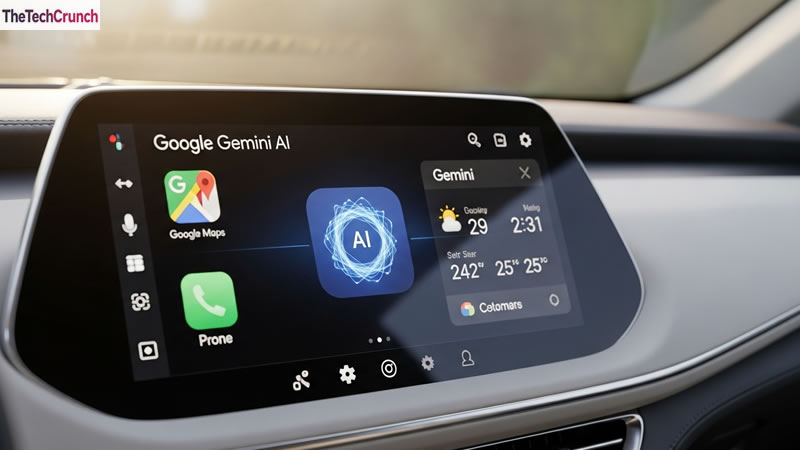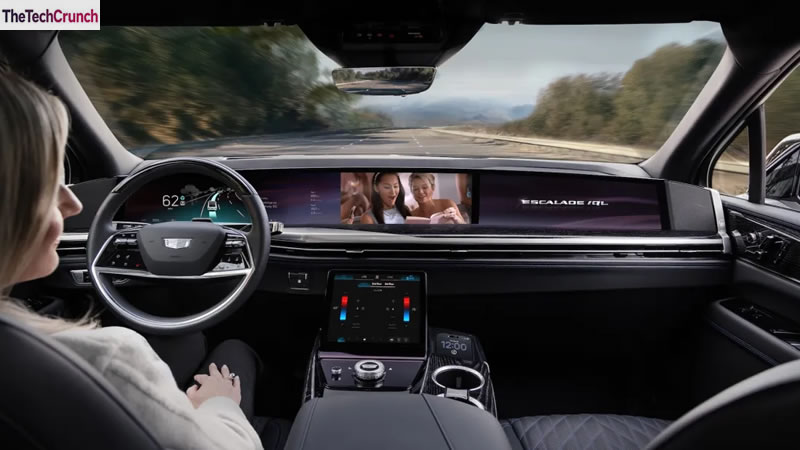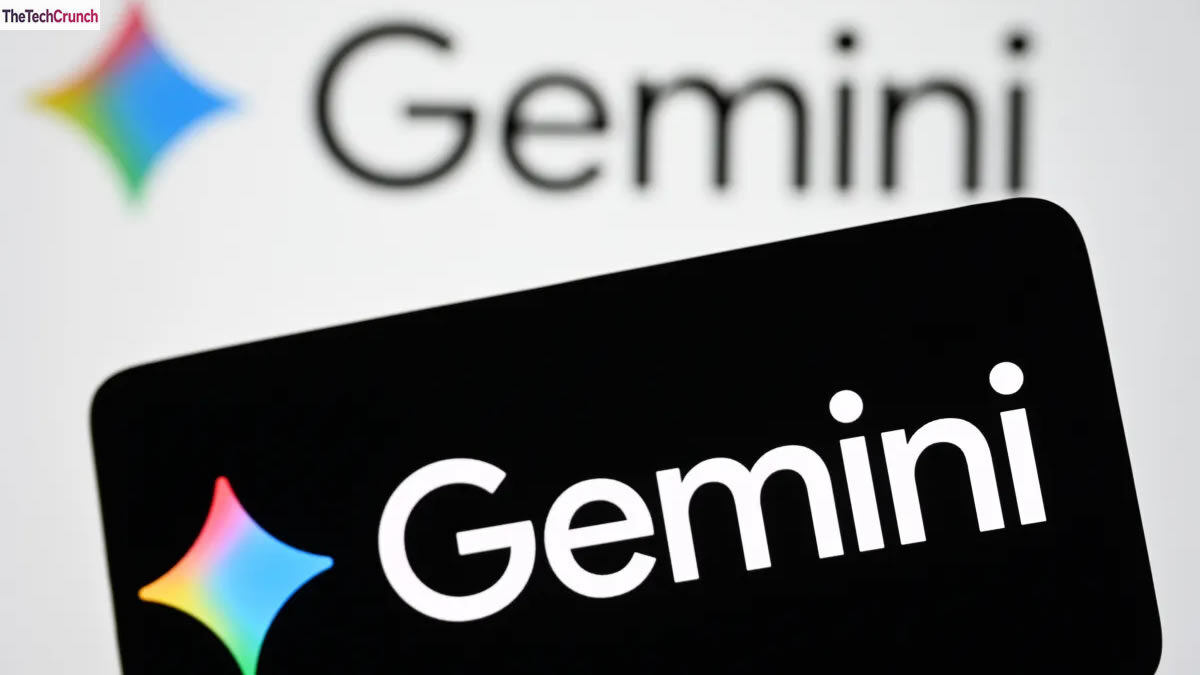General Motors has announced a major step in automotive technology. The company plans to bring Google’s Gemini-powered AI assistant to its vehicles starting in 2026. This move marks a major milestone for the future of connected cars. It shows how artificial intelligence is becoming a key part of everyday driving.
Stay up to date with the latest technology in TheTechCrunch. This covers artificial intelligence, mobile and web apps, modern things, cybersecurity, and general technical news. From AI’s successes to chat and generative tools. Such as smartphones, laptops, and wearables’ special reviews. TheTechCrunch gives an insight into this case.
The partnership between GM and Google aims to deliver a safer, more personalized, and interactive driving experience. With Gemini’s advanced AI capabilities, GM cars will soon be able to do more than follow navigation or play music. They will be able to think, adapt, and assist drivers in real time.
What Gemini AI Brings To GM Vehicles
Gemini is Google’s latest and most advanced AI model. It is designed to handle multiple tasks at once — from understanding natural language to generating text and managing complex conversations. By integrating Gemini into its cars, GM plans to make driving smarter and more intuitive.
The AI assistant will be able to respond to voice commands, answer questions, and perform car-related tasks. For example, drivers can ask the assistant to check tire pressure, adjust the temperature, or find the nearest charging station. Gemini’s deep integration with Google services will also allow seamless control over apps like Maps, Calendar, and YouTube Music.
This means that drivers will no longer have to rely on their phones while driving. Instead, the vehicle itself becomes an intelligent companion that helps manage both travel and daily life.
Designed For Convenience And Safety
GM has emphasized that the Gemini-powered AI assistant will be designed around safety. The system will minimize distractions and help keep drivers focused on the road. Instead of typing or touching screens, users can speak naturally to the car.

For instance, a driver can say, “I’m low on fuel,” and the assistant will automatically find nearby gas stations. It can also monitor driving conditions and warn the user about weather changes or traffic delays.
The AI assistant will use contextual understanding to offer helpful suggestions. If a driver is heading home late, it might suggest sending a message to family or turning on the home lights through smart home integration. This kind of proactive support could redefine convenience in modern cars.
Building On GM’s Tech Legacy
GM has a long history of integrating technology into its vehicles. The company was one of the first to introduce OnStar, an in-car safety and communication system. Over the years, GM has expanded its digital offerings, and the upcoming Gemini integration represents the next evolution.
The new AI system will build on GM’s existing infotainment platform, which already supports Google Maps, Assistant, and Play Store. By upgrading to Gemini, GM can deliver a much more intelligent and conversational experience.
The company believes this approach will set it apart from competitors. While many automakers are adding AI assistants, few are using a model as powerful and versatile as Gemini.
How Gemini Differs From Other Car Assistants
Unlike traditional voice assistants, Gemini will not just follow fixed commands. It will understand complex requests and carry on natural conversations. For example, instead of saying “navigate to work,” a driver can say, “Take me to the fastest route home and stop for coffee on the way.” The AI will handle both tasks without needing multiple commands.
Gemini’s strength lies in its multimodal abilities. It can process text, speech, images, and even context from the car’s sensors. This means the assistant can “see” what’s happening around the car and respond intelligently.
If the driver asks about road conditions or nearby landmarks, the assistant can provide real-time visual or spoken information. This makes driving not only easier but also more engaging and informative.
Connected Ecosystem With Google Services
The collaboration between GM and Google goes beyond cars. It ties into the broader ecosystem of connected devices. Gemini will connect seamlessly with Android phones, Google Home, and other smart devices.
For example, users can sync their schedules, messages, and reminders automatically. When leaving for a meeting, the assistant can suggest the best route based on calendar events and traffic data. It can even adjust the car’s interior settings based on personal preferences, like music, lighting, or temperature.
This level of personalization is part of GM’s vision for the “car as a digital companion.” The company sees a future where vehicles adapt to users’ needs instead of the other way around.
Launch Timeline And Supported Models
GM plans to introduce the Gemini-powered AI assistant in select 2026 models first. It will likely appear in luxury and electric vehicles before expanding to the wider lineup. The rollout will be gradual, ensuring that the system is thoroughly tested for accuracy, safety, and reliability.

The integration will also vary across brands under GM’s umbrella, including Chevrolet, Cadillac, Buick, and GMC. Each brand may customize the AI’s interface and voice to match its identity.
As the system matures, GM aims to push software updates over the air. This will allow existing vehicles to gain new features without requiring a dealership visit.
AI And The Future Of Automotive Design
Bringing Gemini into cars is part of a larger trend toward AI-driven vehicles. Automakers are increasingly focusing on digital experiences rather than just mechanical performance. AI can help predict maintenance needs, optimize routes, and even improve fuel efficiency.
For electric vehicles, AI can play a key role in battery management. It can suggest charging times and locations based on the driver’s habits and schedule. With Gemini, GM will be able to personalize driving like never before.
Experts believe that AI will soon become as essential to cars as engines and wheels. By partnering with Google early, GM is positioning itself to lead this transformation.
Privacy And Data Protection
As cars become smarter, data privacy becomes a critical concern. GM has assured users that all AI interactions will follow strict privacy standards. Personal data will be encrypted, and users will have control over what information is shared.
Explore a complete hub for the latest apps. Smart things and security updates online. Ranging from AI-operated solutions and automation tools. TheTechCrunch offers in-depth articles, comparisons. And specialist analysis is designed to understand the rapidly changing technology. Whether you are keen on robotics, data protection, or the latest digital trends.
Google has also committed to transparency about how Gemini processes data. The goal is to make AI helpful without compromising trust or security. This focus on ethical AI will help both companies build credibility in an increasingly data-conscious world.
TheTechCrunch: The Road Ahead
The introduction of the Gemini-powered AI assistant marks a turning point for GM. It blends innovation, convenience, and safety into one intelligent package. The system is not just about making cars smarter but also about making driving more human-centered.
By 2026, GM drivers will experience a new level of interaction where the car becomes a true companion. The AI will listen, learn, and respond naturally — creating a smoother connection between humans and machines.
This partnership shows how far automotive technology has come. With Gemini’s intelligence and GM’s engineering, the road ahead looks smarter than ever before.
Here Are More Helpful Articles You Can Explore On TheTechCrunch:
- Samsung Takes On Apple’s Vision Pro With New Galaxy XR Headset
- YouTube Adds A Timer For You To Stop Scrolling Shorts
- Several Users Reportedly Complain to FTC That ChatGPT Is Causing Psychological Harm
- X Tests Pay-Per-Use Pricing Model for Its API
- Claude Code Web App: Anthropic’s Next Step in AI Coding
- WhatsApp Changes Its Terms to Bar General Purpose Chatbots from Its Platform
- Too Burned Out to Travel? This New App Fakes Your Summer Vacation Photos for You
- Wikipedia Says Traffic Is Falling Due to AI Search Summaries and Social Video
- Silicon Valley Spooks The AI Safety Advocates


